Want to win scholarships? Try winning them without applying for them.
I know this sounds really counterintuitive and even a bit scammy, especially coming from someone that teaches people how to write scholarship essays for a living. I mean how can you possibly win scholarships without applying for them? But just hear me out!
In my 4 years as an undergrad, I won over 32 scholarships amounting to over $200K. But to get there, I spent a huge amount of time trying to hack the scholarship game, spent even more time making mistakes, and then spent what felt-like an eternity waiting for my first scholarship to come in.
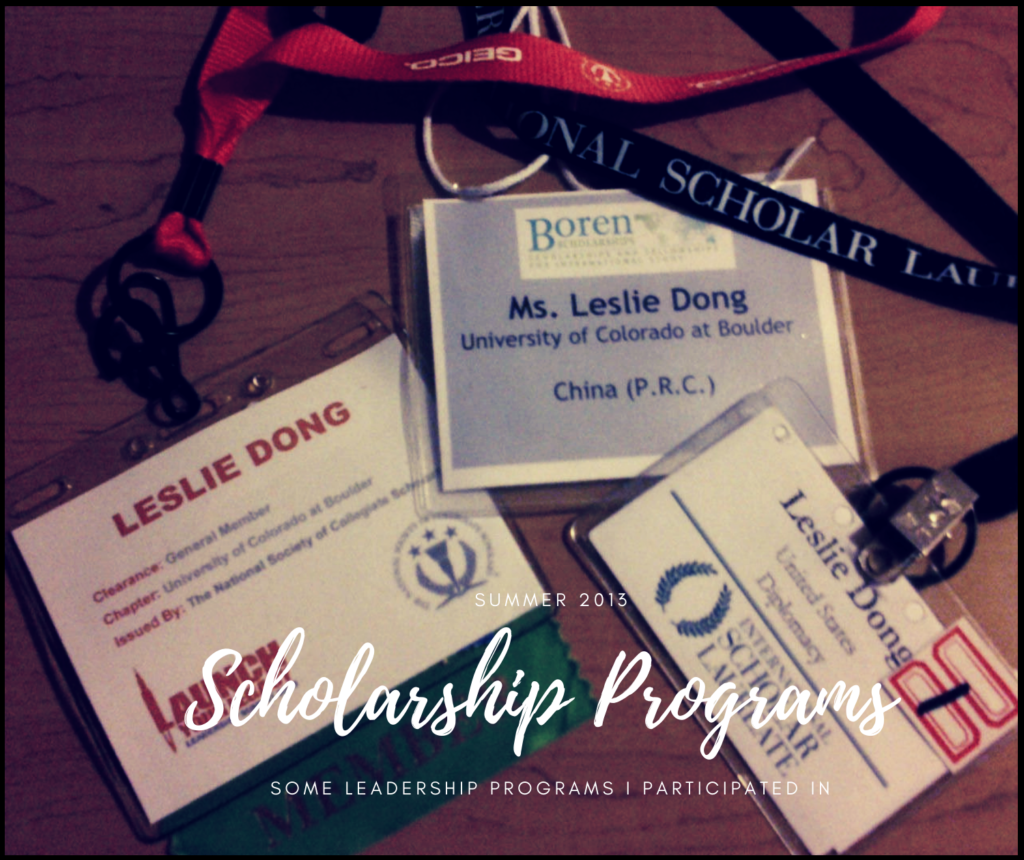
But thankfully, I eventually got the hang of it and almost overnight, the money just started rolling in. Along the way, I realized a really strange (but welcomed) phenomenon. In addition to receiving money from the scholarships that I applied, I also started receiving a sizeable amount of scholarship funds that I never applied for!
Imagine waking up one morning on a mad-rush to get to class because you accidentally overslept and as you dash to your car, you suddenly receive an email that notifies you that you just won a $2500 scholarship that you never apply for.
And not only that, the email lets you know that the check should land in your mailbox later that week and asks you to contact them if you don’t receive the funds in time. Yeah! Too good to be true. But that happened to me. And more than once.
Imagine waking up one morning on a mad-rush to get to class because you accidentally overslept and as you dash to your car, you suddenly receive an email that notifies you that you just won a $2500 scholarship that you never apply for.
And not only that, the email lets you know that the check should land in your mailbox later that week and asks you to contact them if you don’t receive the funds in time. Yeah! Too good to be true. But that happened to me. And more than once.
Here’s how it works:
Option #1: Scholarships Disguised As Awards
It always surprises me how many people are unaware of this. But there are a lot of scholarships out there that are overlooked because instead of being called a “scholarship,” they are disguised as an “award.”
Only it’s not just an award that gives you a nice paper-certificate, it’s recognition and bragging rights that comes with award money.
One of the best examples of this is a Dean’s List Award that I received 8 times. Yes, you didn’t read that wrong. I received an award for each semester that I was in college where I was a full-time student that maintained a GPA of 3.0 or higher.
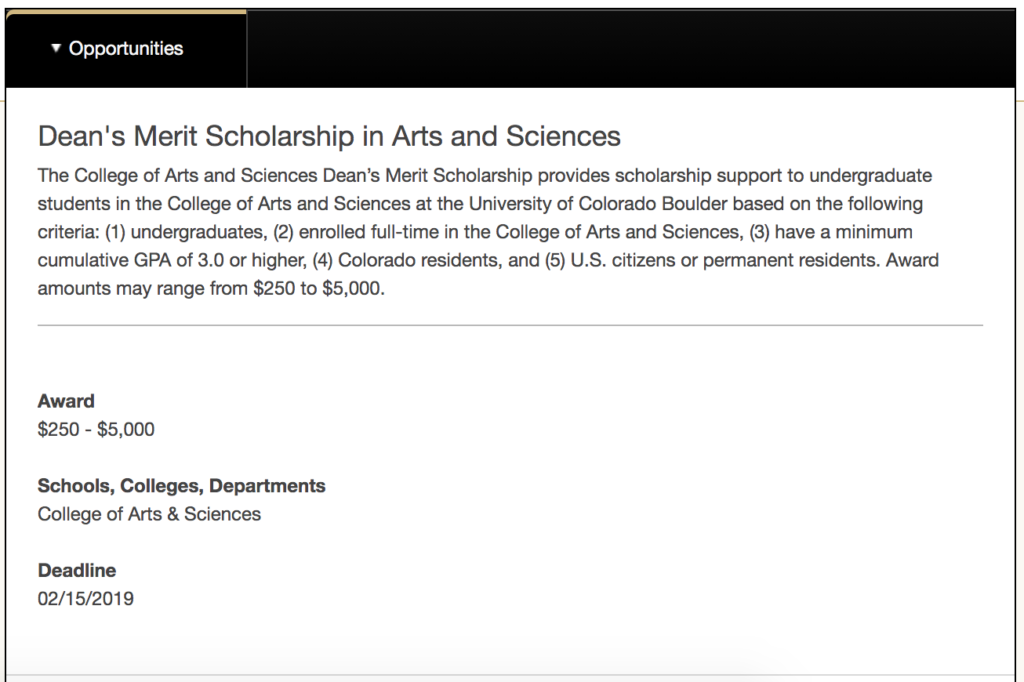
For this particular example, it definitely helps if you’re a relatively good student. But that’s not always the case, some awards are given out to students for their contributions on campus, their leadership abilities, their potential, and much more.
The point is these awards exist and because they’re not labeled as a “scholarship,” they may fall through the cracks if you’re only searching for scholarships at your school’s financial aid office or through online search engines. Make sure that you also look into “awards” under your department of study or college, like this:
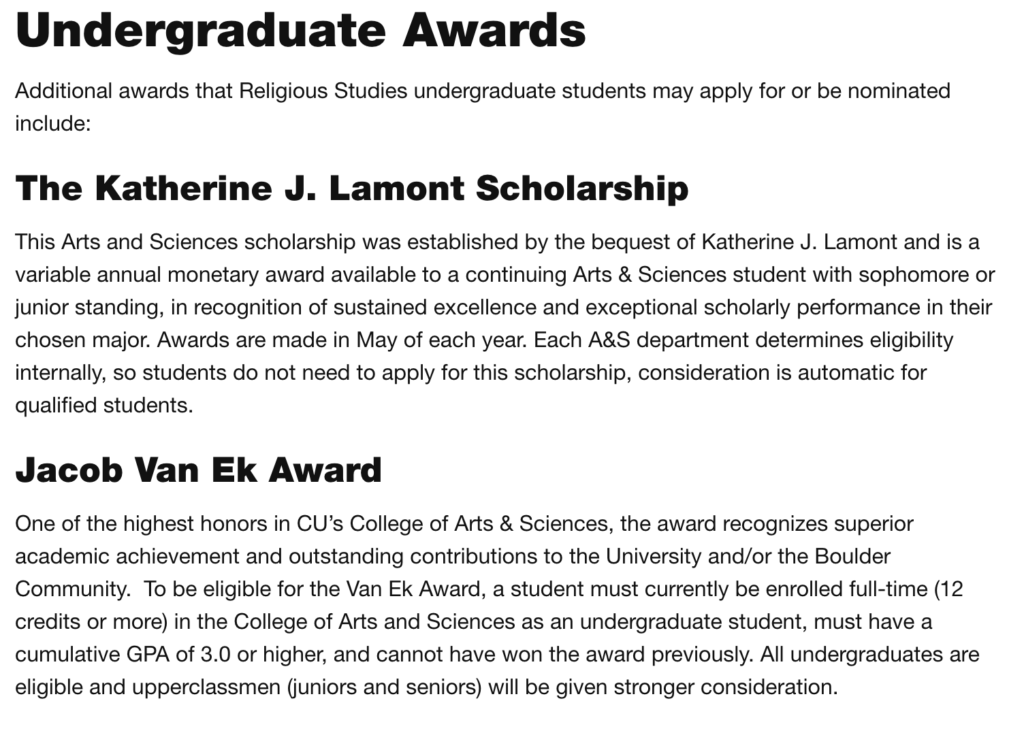
And yes, this applies to high school students too. There were “awards” given out at my high school graduation that provided a small amount of money to help students start their college career.
And if you can’t find any listed awards, make sure that you speak to anyone that may have a better idea of what is available such as your teachers/professors, faculty, department heads, financial aid offices, and more.
Once you have identified the awards, it’ll be easier for you to know how to best position yourself to win one in the future.
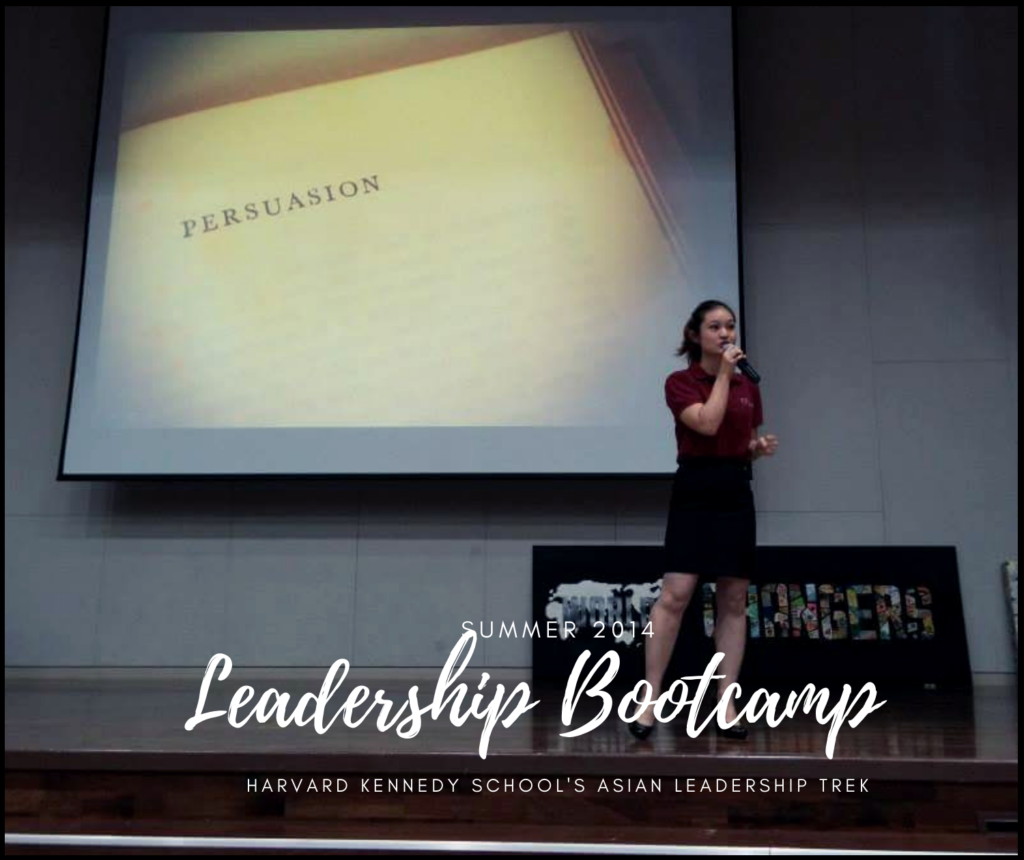
Now before you let your fear of speaking to your teachers/professors get in the way, think about what is at stake. Pretend that by speaking with them, you were able to identify one renewable student award that will award a student with $1000 a year.
You may not think that’s a lot of money per say, but if it automatically renews every semester as long as you meet their criteria, that’s a total of $4000 you earned without spending any extra time/effort to apply for other scholarships or to prepare for a scholarship interview.
It’s basically free money that’s given to you by trying to be a good student which you’re probably doing anyway.
Not to mention, $4000 earned is $4000 less you’ll have to take out in student loans to make ends meet. And by the time you graduate and you need to start paying off interest on that $4000, it will be a lot more than $4000 that you’ll end up forking out of your own wallet.
Option #2: Internal Scholarships
Now this second type of scholarship is a bit more secretive. You can rarely find any information on them on google or your school’s scholarship and awards list and that’s partly because it was intended to be that way.
These scholarships are “internally-nominated” which means that they are not open to the public. If you ever manage to find some public information on these scholarships, they’ll likely tell you that students don’t need to apply, qualified students will be considered automatically.
But what that actually means is that students wouldn’t be able to apply for them even if they wanted to. Professors, faculty, and other staff members nominate candidate internally and discuss who they will award the scholarship to.
The $2500 scholarship I told you about earlier was one of these scholarships.

So how can you try to win a scholarship that you can’t even apply for?
The answer: get to know your professors and other faculty members! This is fairly obvious since you will likely need to ask your professors for recommendation letters sooner or later even if you’re applying for a scholarship.
THIS IS WHAT I DID
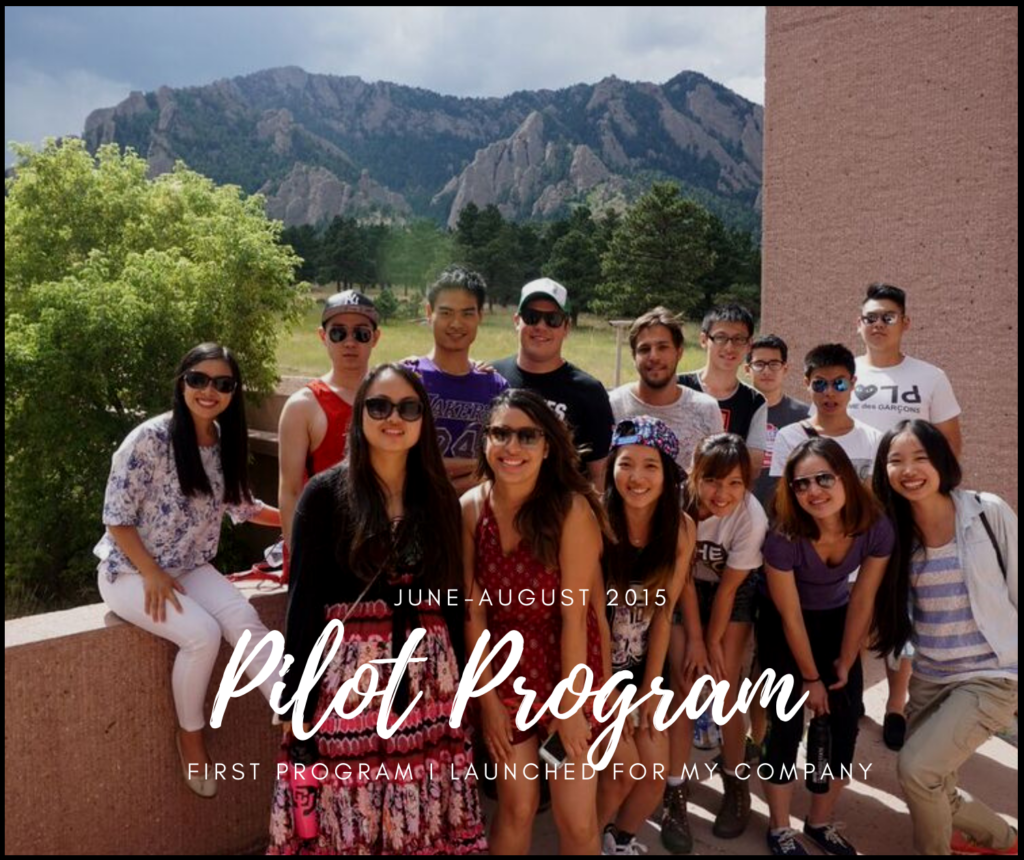
Now my case is a bit extreme so I wouldn’t necessary advise this unless you’re really up for it. But here’s what happened:
I was an Asian Studies and International Affairs major and was extremely passionate about bridging the cultural gap between the US and China. So with the naivety I had as a pearly-eyed undergraduate (little did I know how much work it would take), I founded my own company.
The company specialized in providing innovative exchange programs between my university and 5 other top universities in China. I then launched a pilot program with 20 participating students at the beginning of my senior year.
The only issue is that I couldn’t do it alone. I needed support. So I pitched the idea to all the top professors/faculty in the Asian Studies and International Affairs Department. I have no idea how I did it, but I won them over.
And then I worked closely with them to secure university-sponsored travel insurance and to secure academic credit for each student that participated in my exchange program.
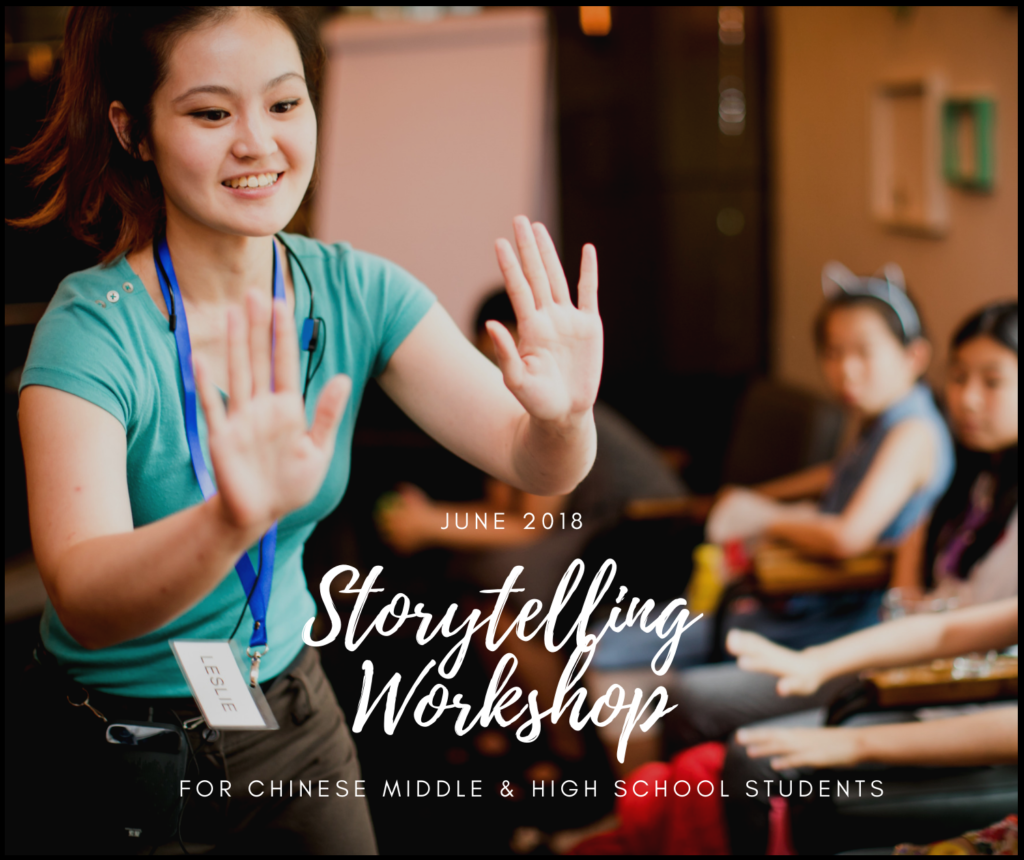
While I am incredibly proud of what I managed to create, it still makes me cringe with a bit of embarrassment thinking back about that time.
My clumsy inexperience and lack of professionalism accidentally ruffed up some feathers and made for some uncomfortable conversations/apologies that I had to make to the professors (talk about growth pains)!
I can tell you more about this company in another blog post if you guys like. Just leave me comment below!
But needless to say, I made an impression and it paid off in countless other ways for me in the years to come.
TIPS ON ENGAGING WITH YOUR PROFESSORS
Now you don’t need to go to as extreme lengths as I did to make an impression on your professors. The truth is very few students really actually put in the time and effort to build a meaningful and memorable relationship with their teachers, professors, and mentors.
So it really doesn’t take much to stand out if you just put in the effort. Here are some ideas on how you can start engaging with your teachers.

Option #3: Create Your Own Scholarship
Now this one is my favorite! Instead of just eyeing the scholarships that are available and that you can apply for, see if you can create your own scholarship opportunity.
And notice I said “scholarship opportunity” as opposed to just a “scholarship.” The reason for this is because I want you to start thinking about scholarships in broader terms instead of just a grant given to support your education.
Think of scholarships as anything that has an associated cost but can help give you an opportunity to enrich your experiences and your resume. This distinction is important because it’ll open up your eyes up to what is possible.
Here are a few examples of opportunities that I’ve secured:
A Free 2 Week Study Abroad Trip to Switzerland, Germany, and France
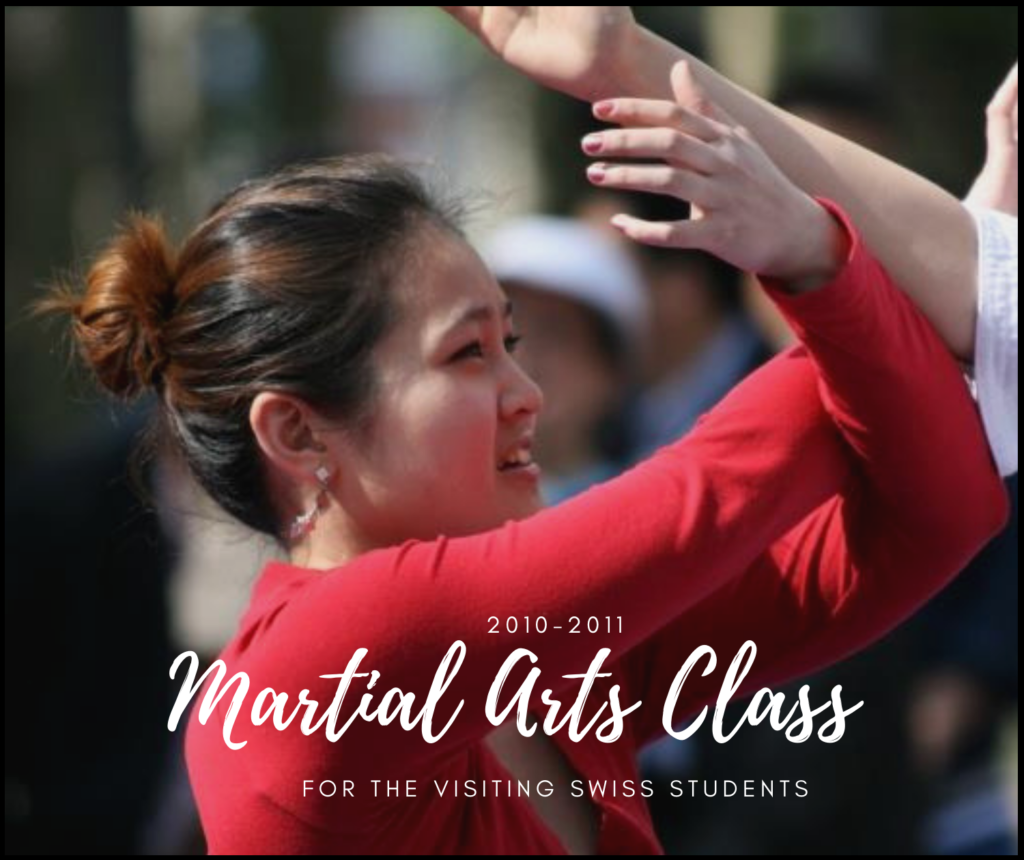
Right after I graduated high school, I took a gap year and studied Mandarin at Tsinghua University, one of the top universities in China (think of it as the Harvard of China). During my year there, Tsinghua University invited a small cohort of Swiss students to visit the Chinese university.
Once I had learned about the program, I immediately volunteered to help organize the visit and to bring the Swiss students around Beijing. Long story short, the visit was a monumental success and a real milestone as it corresponded with Tsinghua University’ Centennial Anniversary.
To thank me for helping to organize the visit, Tsinghua University helped sponsor a spot for me to participate in the Swiss counterpart of the program.
So at 20 years old, I found myself flying to Europe for the first time in my life. And not only that, I had the chance to meet the Swiss Deputy Secretary of State to discuss the legislation of human rights policies in Switzerland, I gave a brief speech at the Chinese Ambassador to Switzerland’s private Residence, visited the UN Headquarter in Geneva, and had a meeting with Brand Managers at Nestle’s Global Headquarters.
Now with that one trip, I had a resume that would help me stand out against a lot of competition for other scholarships in the future.
And what did I pay to enjoy this opportunity? Just an air ticket to Switzerland and a willingness to volunteer my time to assist in the planning and organizing of the program.
You can argue that I wasn’t paid fairly for the work that I put in because there was no monetary compensation, but the intangible, non-quantifiable benefits were beyond priceless.
So at 20 years old, I found myself flying to Europe for the first time in my life. And not only that, I had the chance to meet the Swiss Deputy Secretary of State to discuss the legislation of human rights policies in Switzerland, I gave a brief speech at the Chinese Ambassador to Switzerland’s private Residence, visited the UN Headquarter in Geneva, and had a meeting with Brand Managers at Nestle’s Global Headquarters.
Here’s another example:
“Doing Business in China” Mini-MBA Course
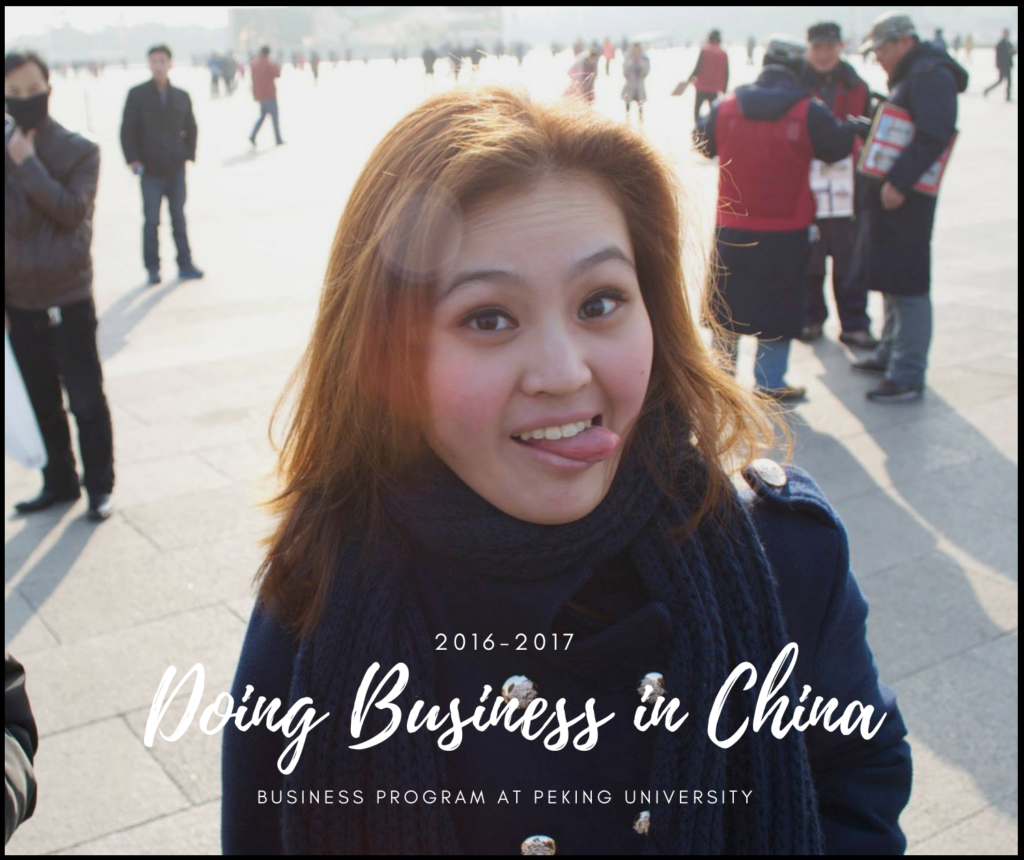
As I mentioned earlier, I majored in Asian Studies and International Affairs and studied Mandarin-Chinese intensively.
In order to gain more experience using Mandarin, I emailed the then Director of programs at Peking University’s Guanghua School of Management (another top program in China) and offered to be a Mandarin-English interpreter for their summer intensive “Doing Business in China” program.
Instead of paying for additional certified interpreters just to be on standby, they decided to take a chance on me.
They knew that I was interested in attending their program but because there was no “scholarship fund” available or any administrative way to just “waive” my tuition, they figured out another way to do it.
They ended up moving their program budget around to accommodate me (food, transportation, event fees, and more).
So will you call that a scholarship? It’s not a scholarship in the traditional sense that they had a scholarship fund available, I applied, and eventually got selected to participate for free.
But it is definitely a scholarship in my book because it gave me a chance to participate in a $3200 educational program without paying anything out of pocket.
Not only did I get to enjoy the same resources that the participants did, I also get to write on my resume that I was a “bilingual interpreter” for a top Chinese university and had real-life experience interpreting for university discussions, lectures, and even company visits such as at HeJun Consulting (a top consulting firm in China) and at the headquarters for Yanjing Beer.
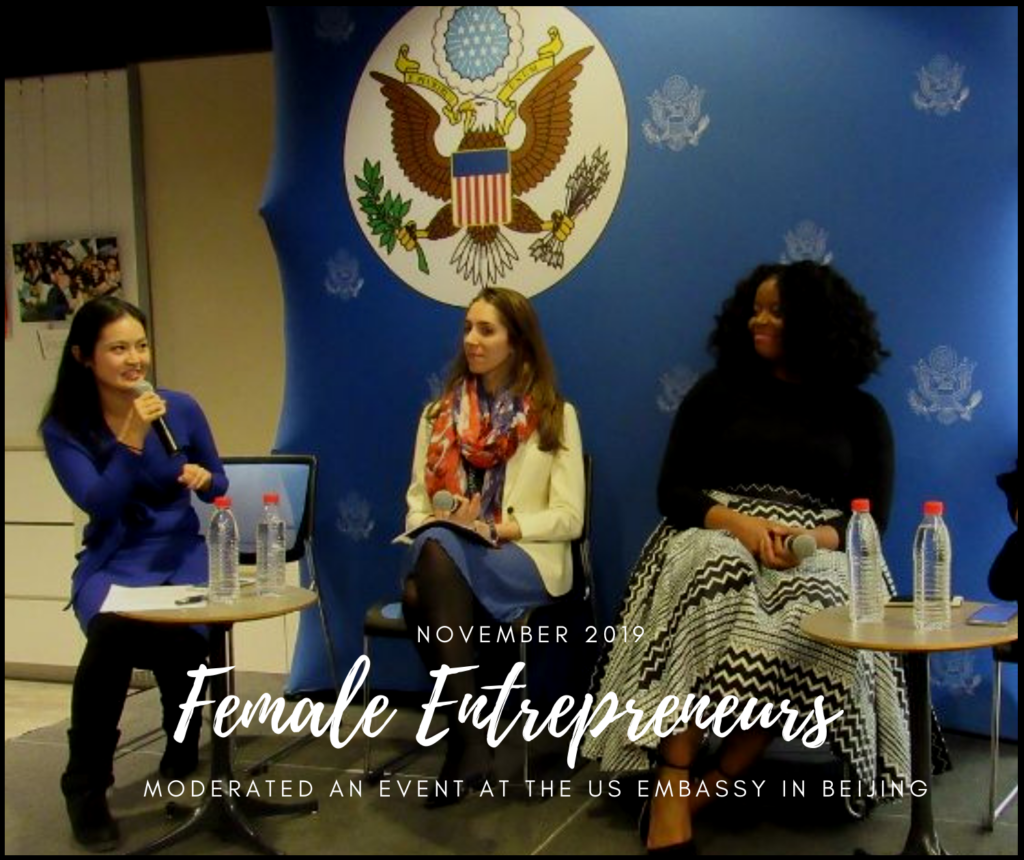
Now I know the critic in you is probably thinking “well all this sounds very cool but it doesn’t directly help with my bottom line since it doesn’t immediately generate cash that can help cover my tuition fees.”
That is true. But I think it’s worth thinking about it as a bigger picture. What you gain from these unique experiences is immense and it is a bit like compound interest. The benefits can compound on their own.
Think about it this way. The more unique experiences you have is the more people that you can network with and the higher the probability that you’ll meet someone that can write you a stellar letter of recommendation, can recommend other opportunities to you, or even recommend other scholarships/educational programs to you.
All of these things will help bulk up your scholarship applications or it’ll lead you to even greater opportunities for your future (that will also buff up your resume). Both are great outcomes.
At some point, the opportunities will just come knocking on your door instead of you going out of your way to hunt them down.
The more unique experiences you have is the more people that you can network with and the higher the probability that you’ll meet someone that can write you a stellar letter of recommendation, can recommend other opportunities to you, or even recommend other scholarships/educational programs to you.
All of these things will help bulk up your scholarship applications or it’ll lead you to even greater opportunities for your future (that will also buff up your resume). Both are great outcomes.
TIPS ON HOW TO CREATE YOUR OWN OPPORTUNITIES
Have I managed to convince you of the power of creating scholarship opportunities yet? If so, here are some tips on how you can create your own opportunities as well.

So there you have it! If you want to maximize the amount of scholarships you can win, don’t just spend all your time applying. Figure out a way to win scholarships without having to expend extra time/energy on writing scholarship applications!
Comment below if there are other topics that you’ll like me to cover like how to build a relationship with your teachers/professors, how to seek out more scholarship opportunities, and more.




